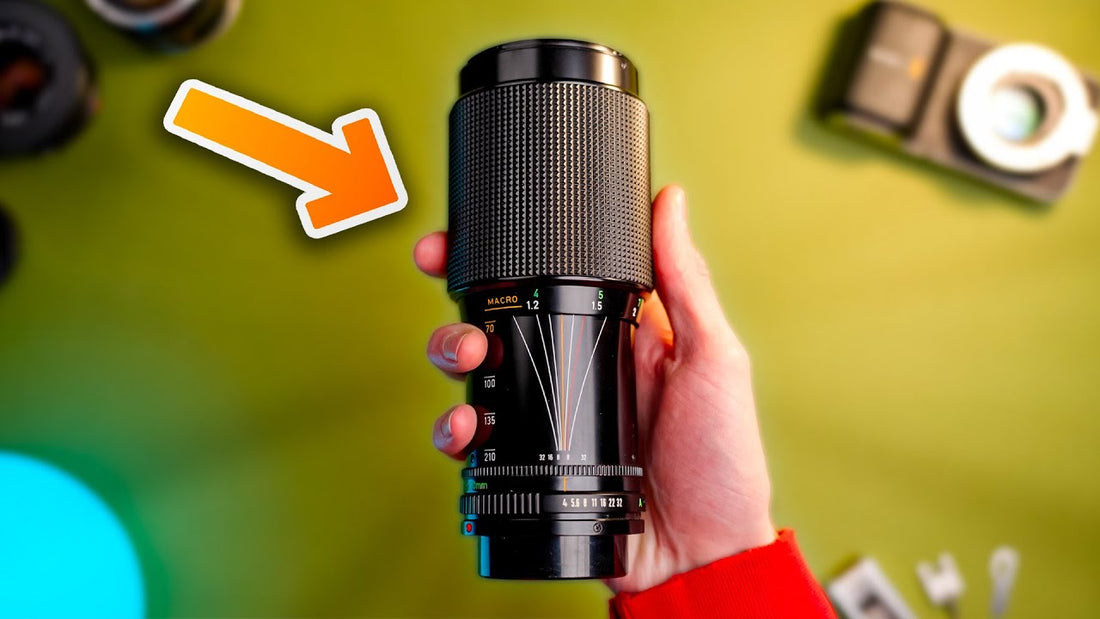
This $50 Vintage Lens Does It ALL! | Canon FD 70-210mm f/4 Review
Check out my full video HERE
This post contains affiliate links. If you click and make a purchase, I may earn a commission at no extra cost to you. Thanks for your support!
Introduction
If you’ve ever wanted a versatile telephoto lens with vintage character—on a shoestring budget—look no further than the Canon FD 70-210mm f/4. Originally produced in the 1980s, this fully manual zoom still holds its own today. For around $50 on the used market, it’s not just a classic piece of gear; it’s also surprisingly capable for both photography and video. Let’s dive into what makes this old-school lens a hidden gem.
Key Features & Why It’s Special
-
70-210mm Focal Range
- A classic telephoto zoom range that covers portraits, wildlife, events—basically any scenario where you need more reach.
- Perfect for compressed perspectives or capturing tight details from a distance.
-
Constant f/4 Aperture
- While not super bright, an f/4 constant aperture is respectable for a vintage zoom, offering consistent exposure throughout the zoom range.
- Delivers decent depth of field control and can be stopped down for sharper results.
-
Compact & Solid Build
- Made of metal, it’s both durable and relatively lightweight for a telephoto.
- Feels robust in hand, despite being over 40 years old.
-
Macro Mode
- Zoom out to 70mm, shift past the closest focus distance, and it enters a hidden macro mode.
- Great for close-up details, product shots, or nature macro without needing a separate lens.
-
Surprisingly Sharp (for its price)
- Wide open at f/4, it’s still respectably sharp with decent contrast.
- Stopped down to f/5.6 or f/8, it rivals newer, pricier telephoto lenses in many everyday shooting situations.
Vintage Handling: The Push-Pull Zoom
-
Push-Pull Mechanism:
- Unlike modern zoom rings, you push or pull the lens barrel to zoom, and rotate the same ring for focus.
- May feel odd at first but can be very efficient once you get used to it—especially for run-and-gun video.
-
Rotating Front Element:
- If you plan to use polarizers or specialty filters, note that focusing or zooming will rotate the filter, which can be inconvenient.
Performance for Photo & Video
-
Photography:
- Perfect for portraits or nature shots when you want that slightly vintage warmth and character.
- Delivers a pleasing, classic look—less clinical than modern digital-era lenses.
-
Videography:
- Despite having no autofocus or image stabilization, it’s a favorite among indie filmmakers looking for organic softness and color.
- The macro mode and push-pull zoom ring add versatility for capturing dynamic, close-up B-roll shots.
-
Adaptability:
- Canon FD lenses can adapt to most mirrorless mounts (Sony E, Canon RF, Micro Four Thirds, etc.) with an inexpensive adapter.
- On some DSLR mounts, you may need an adapter with optical elements, so check compatibility.
Pros & Cons
Pros
- Incredible Value: Around $50 used—a fraction of what modern telephotos cost.
- Solid Image Quality: Good sharpness and vintage coloration for both stills and video.
- Macro Capability: Adds more creative possibilities.
- Sturdy Build: Metal construction stands up well over time.
Cons
- No Autofocus or Stabilization: Purely manual shooting.
- Push-Pull Zoom + Rotating Front Element: Takes time to get comfortable, especially if you rely on polarizing filters.
- Needs Adapters for Modern Cameras: Not a big problem, but an extra piece of gear to remember.
Who Should Buy It?
- Vintage Lens Enthusiasts wanting a telephoto in their collection.
- Budget Filmmakers needing a cheap, adaptable zoom with a classic aesthetic.
- Casual Photographers who don’t mind manual focusing and want a step up in range without breaking the bank.
Who Might Skip It
- Autofocus Dependents: If AF speed or convenience is essential, this lens isn’t for you.
- Low-Light Shooters: At f/4, it’s not ideal for dark environments, and there’s no stabilization to help.
Conclusion
The Canon FD 70-210mm f/4 proves that vintage doesn’t have to mean impractical. With respectable sharpness, a solid build, and the quirky bonus of macro mode, it’s an all-in-one telephoto solution for a mere $50. While it lacks modern autofocus and stabilization, its vintage charm and surprising performance make it a must-have for any budget shooter or vintage lens collector. If you’re ready to embrace manual focus and the push-pull zoom, this FD classic is a steal.
